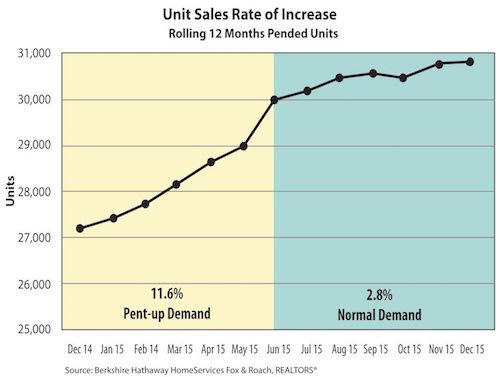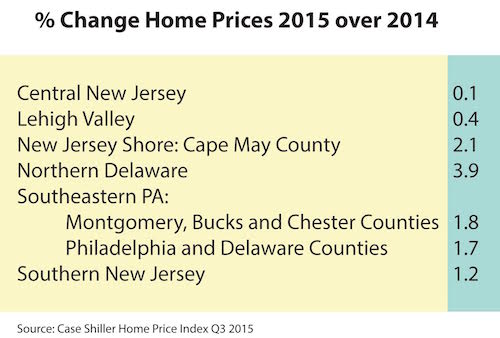
One Good Year Leads To Another!
The real estate market in 2015 was robust, with sales reaching their highest levels since 2007. Rising confidence in the US economy and the real estate market prompted many consumers to step off the sidelines and into their new homes.
Improved Market Conditions
Overall, unit home sales increased a total of 11.7% in 2015 over 2014. The chart below shows us that a significant portion of the growth occurred in the first half of the year, when much of the pent-up demand for homes was unleashed. Sales continued in a positive direction in the second half of the year, but at a more moderate rate, indicative of a healthy market. After all, double-digit growth like the kind we experienced in January through June is unsustainable. This positive trend is promising news as we enter 2016. I anticipate steady growth in our real estate market to continue, and for unit sales to increase 3% over the year. When you have been in real estate as long as I have, you realize that one good year certainly can lead to another!

At the same time that unit sales increased, inventory of houses for sale declined 10% in 2015 over 2014. Increased demand and dwindling supply would normally lead to rising prices. But this is not the case in our market area, nor in many areas of the country. Rather, the median sales price remained flat for the overall market. Home prices have increased anywhere from a modest decline to +3%, depending on their specific location and price range. As always, it’s important to remember that real estate markets are local, sometimes even down to a neighborhood level, so location and price range play an important role in determining the value of a home.

The upper-end of the market remains sluggish, with the exception of Center City Philadelphia, and will most likely continue to be so. This is driven by two factors: First, modest returns on financial investments have more effect on buyers and sellers in the highest price ranges, and second, the mood of today’s buyer has changed. They are no longer interested in what I call “aspirational buying” — buying the biggest and most expensive house they can. Instead of “moving up,” some buyers are purchasing a second home.
Market Trends
Today’s buyers are trending conservative about what they buy. They are more motivated by value than emotion, and they remain cautious about paying what they think might be “too much” for a house. They are very well-educated about the market before beginning their search. Also, they are not interested in houses that they perceive need work. For these reasons, sellers must pay particular attention to ensuring that the house is priced properly and is in great condition. Homes that meet these criteria sell quickly, and many times receive multiple offers. If you are selling your home, most likely you are buying another that is more expensive. If so, then all of the benefits that buyers have right now will be available to you at an even greater level.
2016 and Beyond
Most consumers feel confident about the future and their desire to achieve the dream of owning of home. And there’s reason to be positive:
The US economy continues to improve
Even with a few small increases, the Federal Reserve will keep interest rates low
We are fast approaching full employment
Wage growth has begun to accelerate
Demographics are working in our favor
Millennials’ peak age is the early 20’s, and they will be entering the market to buy their first home in the coming years
Younger baby boomers’ peak age is in the mid-50’s, and they are enjoying their peak earning years now
Another interesting tailwind is the fact that 2016 is a presidential election year. In the previous six cycles when a presidential election occurred, the real estate market did exceptionally well in four of them. The two exceptions were 2008, when the economy collapsed, and 2000, when the dot.com bubble burst. If we take those two years out of the equation, unit sales increased nationally an average of 8.9% in presidential election years. Even when we include 2000 and 2008, unit sales still increased 2%. I’m not sure why this occurred, but it’s a trend I would like to see happen again this year.
There are some headwinds we must be aware of as well. Since the beginning of the year, the fluctuations in the financial markets have made us all a little nervous. Concern about China’s economy, combined with the drop in oil prices and a strong dollar, continue to hinder our economy. And from what we’ve seen, it may be that a large portion of the pent-up demand from the previous downturn has been satisfied. But most economists agree that the US economy and real estate market are both poised for continued growth.
Will the Federal Reserve Bank’s decision to raise short-term interest rates affect mortgage rates? From what we’ve seen so far, it’s had no impact on long-term interest rates. In fact, mortgage rates went down a quarter of a percent after the Fed raised rates. The Fed will continue to increase the short-term interest rate gradually, but mortgage interest rates will remain at historic lows. Contact your Trident Mortgage Company mortgage consultant to get the latest on what is happening with interest rates.
One good year leads to another! Is this the right time for you to buy or sell a home? If you’re thinking the answer might be yes, then it’s time to get in touch with your BHHS Fox & Roach sales associate.
Lawrence F. Flick, IV
Chairman and Chief Executive Officer
Berkshire Hathaway HomeServices Fox & Roach, Realtors® and The Trident Group
Independent View from Joel Naroff
Once again, we see that Wall Street and Main Street don’t necessarily march to the beat of the same drummer. While the U.S. economy continues to move forward, and the labor market keeps tightening, world events, especially concerns about China, have led to significant issues in the stock markets. Given the two divergent indicators, I choose the economy, and the outlook is for the housing market to do very well this year.
Joel L. Naroff, Ph.D. is the President and founder of Naroff Economic Advisors. He is a consultant to Berkshire Hathaway HomeServices Fox & Roach, REALTORS® and The Trident Group. A nationally recognized economic forecasting expert, Joel was awarded the Lawrence Klein Award for Blue Chip forecasting excellence and was the Bloomberg Business News top economic forecaster in 2008. In 2007, he received the National Association of Business Economists Outlook Award and was named the top economic forecaster by MSNBC in 2006.
The domestic economy matters the most with the housing market, as it drives much of the demand. With job gains robust in the last quarter of the year, household incomes are rising, and as the unemployment rate continues to fall, wages and consumer spending should accelerate. The national economy should grow faster in 2016 than in 2015.
Focusing on the domestic economy is critical, as the Federal Reserve has started raising rates to more normal levels. The question is: How fast will they tighten? If the economy remains solid, it is likely the Fed will move cautiously but consistently. The expectation is for at least a one percentage point increase over the year. If growth is faster than expected, it could be more.
Rising rates should not depress the housing market if they result from stronger growth and increasing incomes. Mortgage rates would still remain relatively low, and improving household financial conditions should bring a lot of the pent-up demand back onto the market.
All the economies in the BHHS Fox & Roach, Realtors area are on the rise. Even in the weakest portion, the Atlantic City area, conditions are starting to firm. As the trend toward urbanization continues, with baby boomers and millennials choosing close-in locations, and especially when Comcast’s Innovation and Technology Center opens in Center City Philadelphia, population growth should rise. That bodes extremely well for the housing market in 2016 and beyond.

